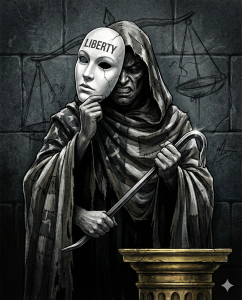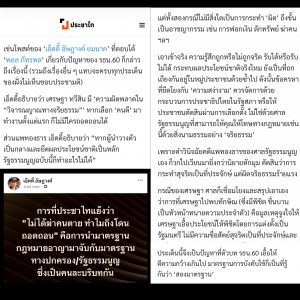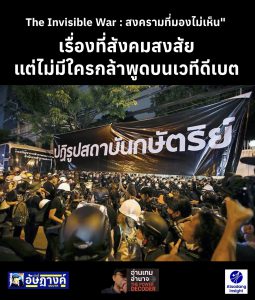
การถอดถอนฐานันดร: กรณีคุณอ้นและพี่น้องตระกูลวิวัชรวงศ์
#อัษฎางค์ยมนาค #การถอดถอนฐานันดรพี่น้องวิวัชรวงศ์
▍ บทนำ
การเป็นสมาชิกพระราชวงศ์ไทยมิได้ขึ้นอยู่กับสายโลหิตแต่เพียงประการเดียว หากยังต้องได้รับการยอมรับหรือสถาปนาอย่างเป็นทางการโดยพระมหากษัตริย์ ซึ่งทรงเป็นองค์ประมุขแห่งราชวงศ์
ซึ่งทรงมีพระราชอำนาจโดยพระราชอัธยาศัยในการกำหนดสถานะของพระบรมวงศานุวงศ์ ตามจารีตประเพณีและรัฐธรรมนูญแห่งราชอาณาจักรไทย การที่บุคคลใดจะได้รับการยอมรับว่าเป็น “สมาชิกพระราชวงศ์” จึงต้องผ่านการสถาปนา การรับรอง และพระราชประสงค์อันชัดแจ้ง
สังคมไทยในเชิงวัฒนธรรมยังคงรักษาโครงสร้างแบบลำดับชั้น (hierarchy) อย่างแน่นแฟ้น โดยเฉพาะในสถาบันพระมหากษัตริย์ ซึ่งมีการให้ความเคารพต่อสถานะ ฐานันดร และจารีตอย่างเคร่งครัด การยอมรับหรือไม่ยอมรับฐานะของบุคคลในราชวงศ์จึงไม่อาจวินิจฉัยจากการอ้างสายโลหิตแต่เพียงฝ่ายเดียว หากต้องสอดคล้องกับคุณค่าทางศีลธรรม ความเหมาะสม และพระราชประสงค์ขององค์พระมหากษัตริย์
▍1. ปัจจัยทางจารีตและวัฒนธรรมที่มีผลต่อการไม่รับคุณอ้น
ในบริบทของประวัติศาสตร์ไทย สมาชิกพระราชวงศ์ต้องมีภาพลักษณ์และพฤติกรรมที่สอดคล้องกับค่านิยมเรื่อง “ความเหมาะสม” (propriety) และ “ความจงรักภักดีต่อสถาบัน”
ดังนั้น แม้บุคคลจะมีสายโลหิตแห่งพระราชวงศ์ แต่หากมิได้รับการสถาปนาอย่างเป็นทางการ หรือมีประวัติที่ขัดต่อจารีตราชสำนัก ก็อาจมิได้รับการรับรองสถานะในทางราชการและสังคม
นอกจากนี้ การแสดงตนว่าเป็นสมาชิกพระราชวงศ์โดยไม่มีฐานันดรศักดิ์ที่ได้รับการสถาปนาโดยพระมหากษัตริย์ อาจเข้าข่ายละเมิดจารีต หรือในบางกรณีอาจกระทบต่อบทบัญญัติทางกฎหมายว่าด้วยการใช้ฐานันดรศักดิ์โดยมิชอบ[^1]
▍2. เหตุการณ์การถอดถอนสถานะ (พ.ศ. 2540)
เมื่อวันที่ 13 มกราคม พ.ศ. 2540 มีหนังสือราชการซึ่งลงนามโดยสมเด็จพระบรมโอรสาธิราชฯ สยามมกุฎราชกุมาร (พระยศในขณะนั้น) ส่งผ่านสถานเอกอัครราชทูตไทย ณ กรุงลอนดอน แจ้งต่อหน่วยงานราชการว่า พระโอรสทั้งสี่ของพระองค์กับหม่อมสุจาริณี มหิดล ณ อยุธยา มิให้ถือเป็นสมาชิกพระราชวงศ์อีกต่อไป และให้ใช้นามสกุล “วิวัชรวงศ์” แทนฐานันดรศักดิ์ “หม่อมเจ้า”[^2]
▍3. ประเด็นเรื่องประกาศราชกิจจานุเบกษา
ในทางจารีต การถอดถอนฐานันดรศักดิ์ของเจ้านายชั้นหม่อมเจ้าขึ้นไป มักจะมีประกาศในราชกิจจานุเบกษาเพื่อให้มีผลเป็นทางการ อย่างไรก็ตาม กรณีของคุณอ้นและพี่น้องมิได้ปรากฏประกาศในราชกิจจานุเบกษา จึงมีบางความเห็นตั้งข้อสังเกตว่าการถอดถอนอาจ “ไม่มีผลทางกฎหมายสมบูรณ์”[^3]
อย่างไรก็ตาม ข้อสังเกตดังกล่าว ไม่สอดคล้องกับหลักกฎหมายไทยโดยสมบูรณ์ เนื่องจากรัฐธรรมนูญแห่งราชอาณาจักรไทย พ.ศ. 2560 มาตรา 11 ได้บัญญัติไว้ชัดเจนว่า
“พระมหากษัตริย์ทรงไว้ซึ่งพระราชอำนาจที่จะสถาปนาและถอดถอนฐานันดรศักดิ์ และพระราชทานและเรียกคืนเครื่องราชอิสริยาภรณ์”[^4]
พระราชอำนาจดังกล่าวเป็นพระราชอำนาจโดยพระราชอัธยาศัย จึงไม่จำเป็นต้องผ่านกระบวนการตามกลไกรัฐสภาหรือฝ่ายบริหาร และในหลายกรณีก็สามารถแสดงออกผ่านพระราชประสงค์โดยตรง หรือเอกสารราชการที่มีผลในทางปฏิบัติ แม้มิได้ประกาศในราชกิจจานุเบกษาก็ตาม
▍4. การยืนยันสถานะโดยปริยาย: บทบาทของพระราชประสงค์
การที่สมเด็จพระบรมโอรสาธิราชฯ (ในขณะยังมิได้ขึ้นครองราชย์) ทรงลงพระนามในหนังสือดังกล่าว ถือเป็นการแสดงพระราชประสงค์โดยตรงในฐานะรัชทายาทโดยชอบธรรม และเมื่อเสด็จขึ้นทรงราชย์เป็นพระมหากษัตริย์รัชกาลที่ 10 โดยมิได้มีพระบรมราชโองการเปลี่ยนแปลงหรือกลับคำพระราชประสงค์เดิม จึงสามารถตีความได้ว่า ทรง “ยืนยันโดยปริยาย” ถึงสถานะที่ได้กำหนดไว้แต่เดิม[^5] ซึ่งถือเป็นหลักที่ได้รับการยอมรับในทางปฏิบัติและกฎหมายมหาชนไทย
▍5. ผลในทางปฏิบัติ
กรณีถอดถอนคุณอ้นและพี่น้องเป็นข้อเท็จจริงที่ปรากฏอย่างชัดเจน โดยมีหนังสือราชการแจ้งให้เปลี่ยนมาใช้นามสกุล “วิวัชรวงศ์” แทนฐานันดร “หม่อมเจ้า” และในทางปฏิบัติ หน่วยงานราชการและสังคมไทยก็ถือปฏิบัติตามพระราชประสงค์นี้มาโดยต่อเนื่อง ทั้งในเอกสารราชการ การอ้างอิงในสาธารณะ และการปฏิบัติต่อบุคคลในตระกูลดังกล่าว[^6]
แม้จะไม่มีประกาศในราชกิจจานุเบกษา แต่การใช้นามสกุล “วิวัชรวงศ์” อย่างเป็นทางการ รวมถึงการไม่ยอมรับฐานันดร “หม่อมเจ้า” ในทางราชการ ย่อมสะท้อนถึงผลของพระราชประสงค์ในทางปฏิบัติอย่างเด่นชัด
▍6. การกลับคืนสู่ฐานันดรศักดิ์: เงื่อนไขและข้อจำกัด
ในหลักกฎหมายและจารีตของราชสำนักไทย การกลับคืนสู่สถานะพระบรมวงศานุวงศ์ หรือการฟื้นฐานันดรศักดิ์เดิมนั้น ต้องมีพระบรมราชโองการโดยเฉพาะเจาะจง เท่านั้น เพราะเป็นพระราชอำนาจที่ไม่อาจดำเนินการโดยกลไกอื่น หรือด้วยการสนับสนุนของสาธารณชน หากไม่มีพระบรมราชโองการเช่นนั้น สถานะเดิมก็ยังคงมีผลอยู่ในทางกฎหมายและสังคม
จนถึงปัจจุบัน ยังไม่ปรากฏว่ามีพระบรมราชโองการเปลี่ยนแปลงสถานะของคุณอ้นและพี่น้อง ตระกูลวิวัชรวงศ์จึงยังถือเป็นสามัญชนตามพระราชประสงค์เดิมของพระมหากษัตริย์
▍สรุป
กรณีคุณอ้นและพี่น้องสะท้อนให้เห็นถึงหลักการสำคัญของกฎหมายรัฐธรรมนูญและจารีตราชสำนักไทย ที่รับรองพระราชอำนาจโดยพระราชอัธยาศัยของพระมหากษัตริย์ในการสถาปนาและถอดถอนฐานันดรศักดิ์ของพระบรมวงศานุวงศ์ แม้ในบางกรณีจะไม่มีประกาศในราชกิจจานุเบกษา แต่หากมีพระราชประสงค์ที่ชัดเจนและมีผลในทางปฏิบัติ ก็ถือว่ามีผลในทางกฎหมายและจารีตอย่างสมบูรณ์ การกลับคืนสู่สถานะเดิมไม่สามารถเกิดขึ้นโดยอัตโนมัติ หากต้องมีพระบรมราชโองการใหม่โดยเฉพาะเจาะจงเท่านั้น
▍เชิงอรรถ
[^1]: ดูพระราชบัญญัติฐานันดรศักดิ์ พุทธศักราช 2484 ซึ่งกำหนดฐานะของผู้มีสิทธิใช้ราชทินนามและเครื่องหมายของฐานันดรศักดิ์ รวมถึงบทกำหนดโทษผู้แอบอ้างใช้โดยมิชอบ
[^2]: หนังสือจากสถานเอกอัครราชทูตไทย ณ กรุงลอนดอน ลงวันที่ 13 มกราคม พ.ศ. 2540 อ้างถึงในเอกสารราชการหลายฉบับที่ปรากฏในกระทรวงการต่างประเทศ
[^3]: ดูตัวอย่างความเห็นจากบทความในวารสารสำนักงาน ก.พ.ร. “สถานะบุคคลและการใช้ฐานันดรศักดิ์” (พ.ศ. 2548)
[^4]: รัฐธรรมนูญแห่งราชอาณาจักรไทย พ.ศ. 2560, มาตรา 11
[^5]: แนวคิด “การยืนยันโดยปริยาย” (tacit confirmation) หมายถึง การที่ผู้มีอำนาจมิได้โต้แย้งหรือเปลี่ยนแปลงการกระทำเดิมเมื่อมีโอกาส ทำให้การกระทำเดิมมีผลสมบูรณ์
[^6]: เอกสารราชการและบันทึกประชุมหน่วยงานราชการต่าง ๆ ที่ใช้นามสกุล “วิวัชรวงศ์” แทนฐานันดรเดิมอย่างต่อเนื่องตั้งแต่ปี 2540 เป็นต้นมา
The Revocation of Royal Titles: The Case of Khun Aon and the Vivacharawongse Siblings
#EddieAtsadang #RoyalTitleRevocation
▍Introduction
In the Thai monarchy, royal lineage alone does not automatically confer membership in the royal family. Recognition must be granted or formalized by the King, who is not only the constitutional monarch but also the head of the royal household. By Thai tradition and under the Constitution, the King holds discretionary royal prerogative in determining the status of royal family members. Thus, recognition as a member of the royal family requires not only lineage, but also formal acknowledgment, conferment of title, or explicit royal will.
Thai society is deeply hierarchical in structure, particularly within the context of the monarchy. Status, rank, and tradition are meticulously respected. The legitimacy of an individual’s royal standing cannot rest solely on bloodline; it must conform to social values of propriety, moral conduct, and above all, the sovereign’s explicit recognition.
▍1. Customary and Cultural Factors: Why Khun Aon Was Not Recognized
Historically, members of the Thai royal family are expected to exemplify propriety and loyalty to the institution. Even with legitimate royal blood, one must be officially acknowledged to hold a royal title or role. In cases where an individual has not been formally granted status—or where their conduct contradicts royal custom or undermines the institution—they may not be publicly or legally recognized as royalty. Moreover, to present oneself as a member of the royal family without a valid title conferred by the King may constitute a breach of custom or even a violation of Thai law concerning unlawful use of noble titles[^1].
▍2. The 1997 Revocation of Titles
On 13 January 1997, a formal letter signed by His Royal Highness Crown Prince Maha Vajiralongkorn (as he was then known) was issued through the Royal Thai Embassy in London. The letter notified Thai authorities that his four sons, born to Mom Sujarinee Mahidol na Ayudhya, were no longer to be regarded as members of the royal family. Their titles of “Mom Chao” (the lowest tier of princely rank) were revoked, and they were instructed to adopt the surname “Vivacharawongse”[^2].
▍3. Absence of Royal Gazette Publication
Traditionally, the revocation of royal titles for individuals ranked Mom Chao and above is published in the Royal Gazette (Ratchakitchanubeksa) to be formalized. In this case, however, no such announcement was made. This has led some to question the legal completeness of the revocation[^3].
Nevertheless, such interpretations are not consistent with Thai constitutional law. Section 11 of the 2017 Constitution of Thailand clearly affirms:
“The King has the prerogative to confer and revoke titles of nobility and decorations.”[^4]
This power is absolute and exercised solely at the King’s discretion. It does not require approval by the legislature or executive branch. Furthermore, royal intentions can be communicated via official correspondence or formal statements—regardless of whether they are published in the Royal Gazette.
▍4. Tacit Confirmation and Royal Intention
The Crown Prince’s signature on the 1997 letter served as a direct expression of royal will, particularly in his capacity as the heir apparent. When he later ascended the throne as King Rama X, and did not reverse or amend his previous directive, this silence may be interpreted as tacit confirmation of the original decision[^5]. In Thai public law, such continuity in royal will is considered valid and binding in both ceremonial and legal contexts.
▍5. Practical Consequences
The revocation of royal titles from Khun Aon and his siblings is not only a matter of record but also of practical effect. Official agencies have since recognized them as commoners bearing the surname “Vivacharawongse.” Government documents, formal communications, and public references all reflect this change[^6].
Despite the absence of a Royal Gazette notice, the sustained use of “Vivacharawongse” and the non-recognition of the title “Mom Chao” in administrative practices underscore the binding nature of the royal decision.
▍6. Restoration of Royal Titles: Legal Constraints
Under Thai legal and royal custom, the restoration of royal status or noble titles can occur only through a new and specific royal command. This is a prerogative reserved for the King alone and cannot be invoked through public demand, judicial review, or political process. In the absence of such a royal decree, the revocation remains in force, both legally and culturally.
To date, no royal command has been issued to reinstate the titles of Khun Aon or his brothers. As such, they continue to be regarded as commoners in accordance with the King’s original decision.
▍Conclusion
The case of Khun Aon and the Vivacharawongse siblings illustrates the foundational principle of royal prerogative in Thai constitutional and customary law. The King, as sovereign and head of the royal family, retains the exclusive right to confer or revoke noble titles. Even in the absence of a formal Royal Gazette announcement, clear royal intention and consistent administrative practice are sufficient for the decision to be regarded as valid and enforceable. The reinstatement of royal titles cannot occur by default or popular will—it requires a new and explicit royal command.
▍Footnotes
[^1]: See the 1941 Royal Titles Act (พระราชบัญญัติฐานันดรศักดิ์ พุทธศักราช 2484), which outlines conditions for lawful use of noble titles and penalties for unauthorized usage.
[^2]: Letter from the Royal Thai Embassy in London, dated 13 January 1997, cited in internal Ministry of Foreign Affairs documentation.
[^3]: See “Legal and Social Considerations on Royal Status” in the Journal of the Office of the Civil Service Commission (2005).
[^4]: Constitution of the Kingdom of Thailand (2017), Section 11.
[^5]: The legal doctrine of tacit confirmation applies when a person in authority does not repudiate or reverse a previous action when given the opportunity, thereby implicitly affirming it.
[^6]: Government documents and official meeting records since 1997 consistently identify the individuals as “Vivacharawongse,” not “Mom Chao.”



